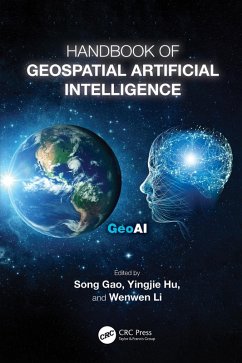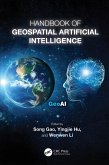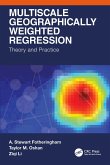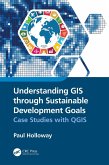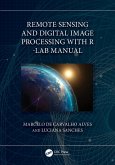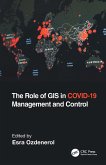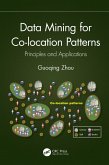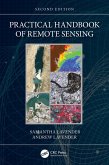Handbook of Geospatial Artificial Intelligence (eBook, PDF)
Redaktion: Gao, Song; Li, Wenwen; Hu, Yingjie
178,95 €
178,95 €
inkl. MwSt.
Sofort per Download lieferbar

89 °P sammeln
178,95 €
Als Download kaufen

178,95 €
inkl. MwSt.
Sofort per Download lieferbar

89 °P sammeln
Jetzt verschenken
Alle Infos zum eBook verschenken
178,95 €
inkl. MwSt.
Sofort per Download lieferbar
Alle Infos zum eBook verschenken

89 °P sammeln
Handbook of Geospatial Artificial Intelligence (eBook, PDF)
Redaktion: Gao, Song; Li, Wenwen; Hu, Yingjie
- Format: PDF
- Merkliste
- Auf die Merkliste
- Bewerten Bewerten
- Teilen
- Produkt teilen
- Produkterinnerung
- Produkterinnerung

Bitte loggen Sie sich zunächst in Ihr Kundenkonto ein oder registrieren Sie sich bei
bücher.de, um das eBook-Abo tolino select nutzen zu können.
Hier können Sie sich einloggen
Hier können Sie sich einloggen
Sie sind bereits eingeloggt. Klicken Sie auf 2. tolino select Abo, um fortzufahren.

Bitte loggen Sie sich zunächst in Ihr Kundenkonto ein oder registrieren Sie sich bei bücher.de, um das eBook-Abo tolino select nutzen zu können.
Geospatial Artificial Intelligence (GeoAI) is the integration of geospatial studies and AI using machine learning and deep learning technologies. This comprehensive handbook explains and discusses key fundamental concepts, methods, models, technologies of GeoAI, recent advances, research tools, and applications in different fields.
- Geräte: PC
- mit Kopierschutz
- eBook Hilfe
Andere Kunden interessierten sich auch für
![Handbook of Geospatial Artificial Intelligence (eBook, ePUB) Handbook of Geospatial Artificial Intelligence (eBook, ePUB)]() Handbook of Geospatial Artificial Intelligence (eBook, ePUB)175,95 €
Handbook of Geospatial Artificial Intelligence (eBook, ePUB)175,95 €![Multiscale Geographically Weighted Regression (eBook, PDF) Multiscale Geographically Weighted Regression (eBook, PDF)]() A. Stewart FotheringhamMultiscale Geographically Weighted Regression (eBook, PDF)98,95 €
A. Stewart FotheringhamMultiscale Geographically Weighted Regression (eBook, PDF)98,95 €![Understanding GIS through Sustainable Development Goals (eBook, PDF) Understanding GIS through Sustainable Development Goals (eBook, PDF)]() Paul HollowayUnderstanding GIS through Sustainable Development Goals (eBook, PDF)105,95 €
Paul HollowayUnderstanding GIS through Sustainable Development Goals (eBook, PDF)105,95 €![Remote Sensing and Digital Image Processing with R - Lab Manual (eBook, PDF) Remote Sensing and Digital Image Processing with R - Lab Manual (eBook, PDF)]() Marcelo de Carvalho AlvesRemote Sensing and Digital Image Processing with R - Lab Manual (eBook, PDF)52,95 €
Marcelo de Carvalho AlvesRemote Sensing and Digital Image Processing with R - Lab Manual (eBook, PDF)52,95 €![The Role of GIS in COVID-19 Management and Control (eBook, PDF) The Role of GIS in COVID-19 Management and Control (eBook, PDF)]() The Role of GIS in COVID-19 Management and Control (eBook, PDF)48,95 €
The Role of GIS in COVID-19 Management and Control (eBook, PDF)48,95 €![Data Mining for Co-location Patterns (eBook, PDF) Data Mining for Co-location Patterns (eBook, PDF)]() Guoqing ZhouData Mining for Co-location Patterns (eBook, PDF)47,95 €
Guoqing ZhouData Mining for Co-location Patterns (eBook, PDF)47,95 €![Practical Handbook of Remote Sensing (eBook, PDF) Practical Handbook of Remote Sensing (eBook, PDF)]() Samantha LavenderPractical Handbook of Remote Sensing (eBook, PDF)50,95 €
Samantha LavenderPractical Handbook of Remote Sensing (eBook, PDF)50,95 €-
-
-
Geospatial Artificial Intelligence (GeoAI) is the integration of geospatial studies and AI using machine learning and deep learning technologies. This comprehensive handbook explains and discusses key fundamental concepts, methods, models, technologies of GeoAI, recent advances, research tools, and applications in different fields.
Dieser Download kann aus rechtlichen Gründen nur mit Rechnungsadresse in A, B, BG, CY, CZ, D, DK, EW, E, FIN, F, GR, HR, H, IRL, I, LT, L, LR, M, NL, PL, P, R, S, SLO, SK ausgeliefert werden.
Produktdetails
- Produktdetails
- Verlag: Taylor & Francis eBooks
- Seitenzahl: 468
- Erscheinungstermin: 29. Dezember 2023
- Englisch
- ISBN-13: 9781003814924
- Artikelnr.: 69629122
- Verlag: Taylor & Francis eBooks
- Seitenzahl: 468
- Erscheinungstermin: 29. Dezember 2023
- Englisch
- ISBN-13: 9781003814924
- Artikelnr.: 69629122
- Herstellerkennzeichnung Die Herstellerinformationen sind derzeit nicht verfügbar.
Song Gao is an Assistant Professor and the Director of Geospatial Data Science Lab at the University of Wisconsin-Madison. He holds a Ph.D. degree in Geography from the University of California-Santa Barbara. His research interests are on Spatial Data Science and GeoAI approaches to Human Mobility and Social Sensing. He has authored and co-authored over 50 peer-reviewed articles in prominent journals and conference proceedings. He is the recipient of various research and teaching awards at the university, state, and international levels, including the Waldo Tobler Young Researcher Award in GIScience. He serves as the Associate Editor for Annals of GIS, and editorial board member for Scientific Reports, PLOS One, and Guest Editor for IJGIS, TGIS, and GeoInformatica. He has been a lead organizer for the AAG symposiums on GeoAI and Deep Learning and and for the ACM SIGSPATIAL GeoAI workshops. Yingjie Hu is an Assistant Professor in the Department of Geography at the University at Buffalo, NY, and at the National Center for Geographic Information and Analysis (NCGIA). He holds a PhD from the Department of Geography at UC Santa Barbara. He is the author of over 50 peer-reviewed articles in top international journals and conferences. He and his work received awards at international, national, and university levels, including Waldo-Tobler Young Researcher Award, GIScience 2018 Best Full Paper Award, and others. His research was also covered by major media such as Reuters and VOA News. Wenwen Li is a Full Professor in the School of Geographical Sciences and Urban Planning, Arizona State University, where she heads the CyberInfrastructure and Computation Intelligence Lab. Li's work has been applied to several scientific disciplines, including polar science, climatology, public health, hydrology and urban studies. Her research has been supported by various funding agencies, including the National Science Foundation (NSF), United States Geological Survey (USGS), and Open Geospatial Consortium. Li was the chair of the Association of American Geographers' cyber-infrastructure specialty group from 2013-2014; a member of the Spatial Decision Support Consortium at the University of the Redlands (2015-); and a graduate faculty member in the Computer Science program at ASU (2016-). Li is also the 2015 NSF CAREER award winner and 2021 NSF Mid-CAREER award winner.
Section 1: Historical Roots of GeoAI 1. Introduction to Geospatial
Artificial Intelligence (GeoAI) 2. GeoAI's Thousands Years of History 3.
Philosophical Foundations of GeoAI Section 2: GeoAI Methods 4. GeoAI
Methodological Foundations: Deep Neural Networks and Knowledge Graphs 5.
GeoAI for Spatial Image Processing 6. Spatial Representation Learning in
GeoAI 7. Intelligent Spatial Prediction and Interpolation Methods 8.
Heterogeneity-Aware Deep Learning in Space: Performance and Fairness 9.
Explainability in GeoAI 10. Spatial Cross-Validation for GeoAI Section 3:
GeoAI Applications 11. GeoAI for the Digitization of Historical Maps 12.
Spatiotemporal AI for Transportation 13. GeoAI for Humanitarian Assistance
14. GeoAI for Disaster Response 15. GeoAI for Public Health 16. GeoAI for
Agriculture 17. GeoAI for Urban Sensing Section 4: Perspectives for the
Future of GeoAI 18. Reproducibility and Replicability in GeoAI 19. Privacy
and Ethics in GeoAI 20. A Humanistic Future of GeoAI 21. (Geographic)
Knowledge Graphs and Their Applications 22. Forward Thinking on GeoAI
Artificial Intelligence (GeoAI) 2. GeoAI's Thousands Years of History 3.
Philosophical Foundations of GeoAI Section 2: GeoAI Methods 4. GeoAI
Methodological Foundations: Deep Neural Networks and Knowledge Graphs 5.
GeoAI for Spatial Image Processing 6. Spatial Representation Learning in
GeoAI 7. Intelligent Spatial Prediction and Interpolation Methods 8.
Heterogeneity-Aware Deep Learning in Space: Performance and Fairness 9.
Explainability in GeoAI 10. Spatial Cross-Validation for GeoAI Section 3:
GeoAI Applications 11. GeoAI for the Digitization of Historical Maps 12.
Spatiotemporal AI for Transportation 13. GeoAI for Humanitarian Assistance
14. GeoAI for Disaster Response 15. GeoAI for Public Health 16. GeoAI for
Agriculture 17. GeoAI for Urban Sensing Section 4: Perspectives for the
Future of GeoAI 18. Reproducibility and Replicability in GeoAI 19. Privacy
and Ethics in GeoAI 20. A Humanistic Future of GeoAI 21. (Geographic)
Knowledge Graphs and Their Applications 22. Forward Thinking on GeoAI
Section 1: Historical Roots of GeoAI 1. Introduction to Geospatial
Artificial Intelligence (GeoAI) 2. GeoAI's Thousands Years of History 3.
Philosophical Foundations of GeoAI Section 2: GeoAI Methods 4. GeoAI
Methodological Foundations: Deep Neural Networks and Knowledge Graphs 5.
GeoAI for Spatial Image Processing 6. Spatial Representation Learning in
GeoAI 7. Intelligent Spatial Prediction and Interpolation Methods 8.
Heterogeneity-Aware Deep Learning in Space: Performance and Fairness 9.
Explainability in GeoAI 10. Spatial Cross-Validation for GeoAI Section 3:
GeoAI Applications 11. GeoAI for the Digitization of Historical Maps 12.
Spatiotemporal AI for Transportation 13. GeoAI for Humanitarian Assistance
14. GeoAI for Disaster Response 15. GeoAI for Public Health 16. GeoAI for
Agriculture 17. GeoAI for Urban Sensing Section 4: Perspectives for the
Future of GeoAI 18. Reproducibility and Replicability in GeoAI 19. Privacy
and Ethics in GeoAI 20. A Humanistic Future of GeoAI 21. (Geographic)
Knowledge Graphs and Their Applications 22. Forward Thinking on GeoAI
Artificial Intelligence (GeoAI) 2. GeoAI's Thousands Years of History 3.
Philosophical Foundations of GeoAI Section 2: GeoAI Methods 4. GeoAI
Methodological Foundations: Deep Neural Networks and Knowledge Graphs 5.
GeoAI for Spatial Image Processing 6. Spatial Representation Learning in
GeoAI 7. Intelligent Spatial Prediction and Interpolation Methods 8.
Heterogeneity-Aware Deep Learning in Space: Performance and Fairness 9.
Explainability in GeoAI 10. Spatial Cross-Validation for GeoAI Section 3:
GeoAI Applications 11. GeoAI for the Digitization of Historical Maps 12.
Spatiotemporal AI for Transportation 13. GeoAI for Humanitarian Assistance
14. GeoAI for Disaster Response 15. GeoAI for Public Health 16. GeoAI for
Agriculture 17. GeoAI for Urban Sensing Section 4: Perspectives for the
Future of GeoAI 18. Reproducibility and Replicability in GeoAI 19. Privacy
and Ethics in GeoAI 20. A Humanistic Future of GeoAI 21. (Geographic)
Knowledge Graphs and Their Applications 22. Forward Thinking on GeoAI
